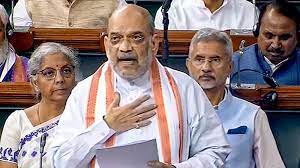Empowering Justice: Lok Sabha’s Progressive Strides in Criminal Law Amendments
Manoj Kumar Pathak
In ongoing Parliament Winter Session, the Lok Sabha has successfully passed three crucial criminal law amendment bills that will replace IPC, CrPC and Evidence Act, marking a pivotal step towards a more robust legal framework. These legislative changes underscore the government’s commitment to enhancing the country’s judicial system and addressing contemporary challenges. The Bharatiya Nyaya Sanhita will replace the Indian Penal Code-1860, the Bharatiya Nagarik Suraksha Sanhita will replace the CrPC of 1882 and the Bharatiya Sakshya Bill will replace the Indian Evidence Act of 1872.
The first of the bills focuses on strengthening laws related to a range of criminal offenses, reflecting a nuanced approach to evolving societal needs. By amending existing statutes, the Lok Sabha aims to adapt the legal landscape to address emerging challenges, providing law enforcement agencies with more effective tools to combat crime.
One noteworthy amendment pertains to the enhancement of penalties for certain offenses, sending a clear message that the government takes a strong stance against unlawful activities. Striking a balance between deterrence and rehabilitation, these changes signal a commitment to fostering a safer and more secure environment for citizens.
The second bill in the series addresses procedural aspects of criminal law, streamlining processes to ensure a more expeditious and fair dispensation of justice. By incorporating technological advancements, the Lok Sabha aims to reduce delays in legal proceedings, a critical aspect in improving the overall efficiency of the justice system.
Moreover, the bill emphasizes the importance of victim-centric approaches, recognizing the rights and well-being of those affected by criminal activities. The inclusion of victim impact statements and other measures ensures a more comprehensive and compassionate legal framework that aligns with contemporary standards of justice.
The third bill underscores the Lok Sabha’s commitment to adapting laws to the digital age. Recognizing the growing prevalence of cybercrime, the amendments aim to fortify the legal arsenal against online offenses. By defining and penalizing digital crimes more precisely, lawmakers intend to create a deterrent effect while ensuring that the legal system remains agile in the face of technological advancements.
As these bills move forward in the legislative process, it is essential to acknowledge the collaborative effort involved in their formulation. Lawmakers, legal experts, and stakeholders have contributed to a comprehensive and forward-looking set of amendments, signaling a commitment to addressing the evolving nature of crime in society.
While the Lok Sabha’s passage of these criminal law amendments is a commendable step, the success of these legislative changes will ultimately be measured by their effective implementation. It is imperative for the government to work in tandem with law enforcement agencies, the judiciary, and civil society to ensure that these reforms translate into tangible improvements in the justice delivery system.
the Winter Session of Parliament has witnessed a proactive and progressive approach towards criminal law amendments. The Lok Sabha’s commitment to adapting the legal framework to contemporary challenges reflects a broader commitment to justice and societal well-being. As these amendments become law, their impact on the legal landscape will be closely observed, with the hope that they contribute significantly to a more just and secure society.


